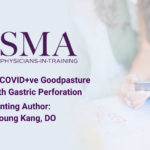Abstract | May 3, 2021
A Rare Case of COVID+ve Goodpasture Syndrome with Gastric Perforation
Learning Objectives
- Discuss impact of chronic steroid use, GI complications
- Discuss potential complications post surgical intervention for gastric perforation on chronic steroids
- Discuss implications for anticoagulation in the setting of hypercoagulable state complicated by chronic steroid
Introduction:
Peptic ulcer disease (PUD) is a well-known complication seen in patients with chronic steroid use. However, gastric perforation is not as common as PUD. Diagnosis of bowel perforation should be considered in patients with high risk factors such prior history of PUD, chronic steroids use, in the setting of acute onset abdominal pain High index of clinical suspicion and early diagnosis is required for timely intervention. Early diagnosis and treatment is imperative to prevent complications and decrease mortality secondary to bowel perforation.
Case report:
37 y/o Hispanic male with PMHx of Goodpasture’s syndrome,( on cyclophosphamide and oral prednisone 60mg daily), End-stage Kidney disease {on Hemodialysis(HD)}, HTN and COVID-19 presented to our hospital for hemoptysis. Initially, patient had minimal symptoms of COVID which progressed within a week. He developed SOB, acute hypoxic respiratory failure, requiring 5L of oxygen supplementation. He was admitted to our hospital for close monitoring. Patient was treated with guideline mediated medical management for COVID-19 with Vitamin C & Zinc supplementation, Remdesvir and 2 doses of convalescent plasma. Patient’s prednisone 60mg was continued for Goodpasture’s syndrome. Patient also had Pepcid 20mg qd for GI prophylaxis. We were successfully able to wean him to 1-2L of O2 after 5 days of hospitalization. On day 6 of his clinical course, the patient started to complain about sudden onset of abdominal pain. We obtained CT imaging of his abdomen and pelvis, which revealed a large amount of free air present within the anterior/upper aspect of the abdomen. Surgery was emergently consulted and he was taken for exploratory laparotomy. In the OR, a 4 inch gastric perforation at the greater curvature was found with leaking gastric contents. Partial gastrectomy was performed. Postoperatively, the patient was closely monitored in the ICU. The morning following his gastrectomy, code blue was called secondary to bradycardia. ROSC was achieved in 10 minutes. His post code blue EKG showed ST elevations in Inferior leads. Patient went into cardiogenic shock even on multiple pressors. Cardiologist on call was notified. Unfortunately, the patient went into PEA arrest and expired.
Discussion:
We present an interesting and unusual case of a patient with Goodpasture’s syndrome who has had a deadly complication of steroid-induced gastric ulcer leading to bowel perforation. Bowel perforation is a lethal complication and mortality rate remains pretty high, especially those with NSAIDs, aspirin and steroid use[7,11]. High index of clinical suspicion and early diagnosis is required. If diagnosed in timely manner, emergent surgical consultation and surgery is required to decrease deadly complications such as peritonitis or septic shock.
There has been evidence of chronic steroid use causing complications post-surgery such as increased bleeds, post-op leak, thrombotic complications [2,4,5,9,10,12]. The pathophysiology of corticosteroids promoting the development of gastric complications seems to occur via different mechanisms. One mechanism suggested is via suppression of biosynthesis of the gastric cytoprotective prostaglandins as well as suppression of peroxidase, increasing availability of hydroxyl radicals [1]. Corticosteroids is also known to increase acid secretion with gastrin and parietal cell hyperplasia [8]. Corticosteroids also delay wound healing by suppressing the production of inflammatory cells required for the initial process of wound healing [8]. Other explanations include decreased gastric mucus production and gastric bicarbonate secretion with steroids. Studies have shown that steroids in combination of NSAIDs are significantly more ulcerogenic, both together would add an additive effect that increases the risk of having gastric ulcer by 3-6 times [3,4,7]. Corticosteroids together can become a risk factor for PUD and increase risk for perforation if higher dosage of steroids if used greater than a month [6]. It is predominantly seen in elderly population and long term usage of steroids ( >1000mg for a month)[3,6,7]. In experimental studies some glucocorticoids such as dexamethasone have seemed potentially more ulcerogenic than others.
In patients more prone for gastric ulcers, in this case secondary to chronic steroid use, greater precaution must be taken for GI prophylaxis. Increased surveillance and vigilance for complications such as gastric perforation is deemed necessary in such population. Further studies would be required to establish recommended GI prophylaxis in patients prone to gastric ulcers and perforations secondary to chronic steroids use. In addition, in the setting of COVID 19, further studies should be conducted for risk vs benefit of anticoagulation in such hypercoagulable states, complicated with history of chronic steroid use.

